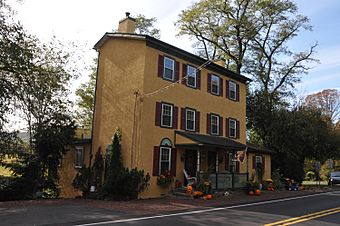Brownsburg Village Historic District facts for kids
The Brownsburg Village Historic District is a special area in Brownsburg, Pennsylvania, located in Upper Makefield Township. It's like a protected neighborhood where many old buildings and places are kept safe because they are important to history. This district covers about 23 acres and was officially recognized in 1994.
Contents
What Makes Brownsburg Historic?
A historic district is a group of buildings, structures, or sites that share a connection to history. In Brownsburg, this district includes 37 buildings, one site, and two structures that help tell the story of the past. These are called "contributing" elements because they add to the area's historical importance.
Old Buildings and Their Styles
Most of the buildings in the Brownsburg Village Historic District were built a long time ago, between 1810 and 1840. They show off two main types of architecture:
- Federal style: This style was popular in the United States after the American Revolution. Buildings often look balanced and simple, with neat rows of windows.
- Italianate style: This style became popular a bit later. Buildings often have low-pitched roofs, wide overhanging eaves, and tall, narrow windows.
Some of the oldest and most interesting buildings include the Beaumont Tavern House and its nearby tenement. Other important buildings are the Grace Johnson House, the Gilbert Tenement, and the Andrew Jamison House. There's also the Slack Bungalow, which was built around 1920.
The Delaware Canal
The district also includes parts of the Delaware Division of the Pennsylvania Canal. Canals were like man-made rivers that helped transport goods and people a long time ago. The structures related to this canal are an important part of the district's history. They remind us how people used to move things around before trains and cars were common.
National Recognition
The Brownsburg Village Historic District was added to the National Register of Historic Places in 1994. This is a list kept by the United States government of places that are important to American history. When a place is on this list, it means it's recognized nationally for its historical value. It also helps protect these places for future generations to learn from and enjoy.




